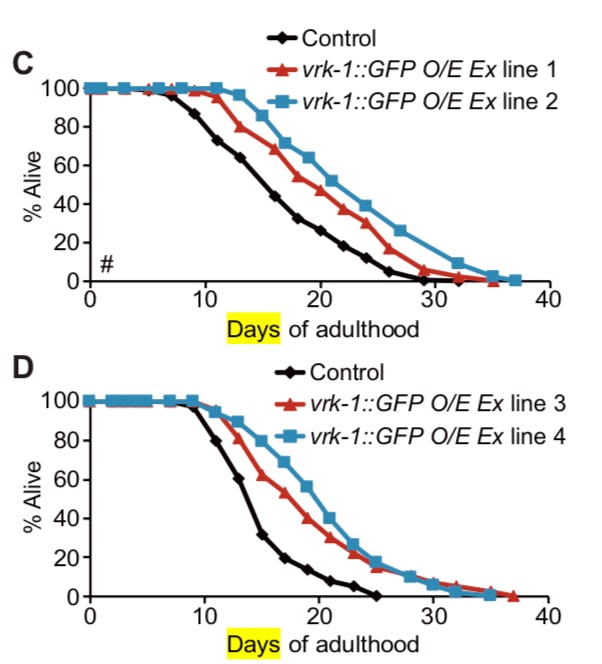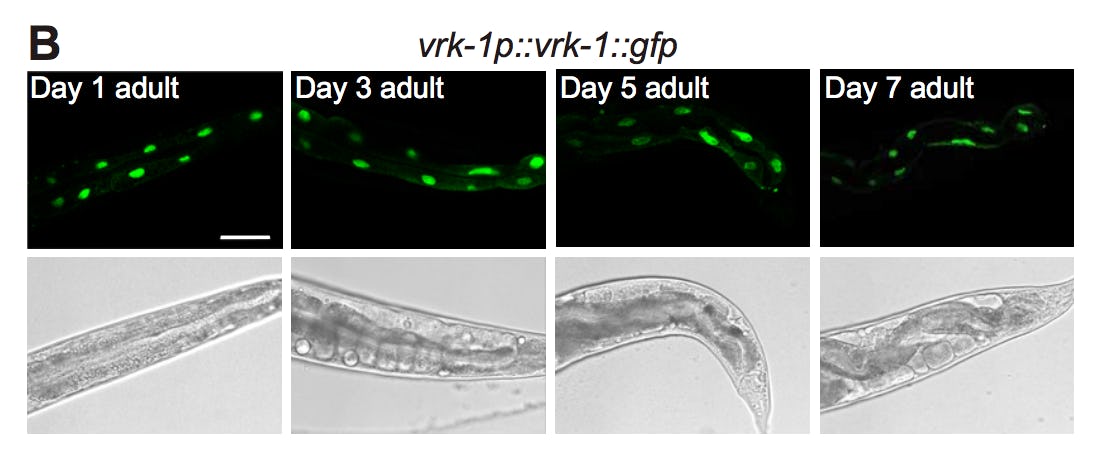.
The keys to extending life are in the details. Tiny tails at the ends of chromosomes called telomeres erode with age but can be lengthened. Deep inside our cells DNA-based clocks slowly tick away and determine our "biological age."
New research hones in on an innate longevity switch that already exists in the body, and has already proven that it can extend life in worms. What matters for extending the human lifespan, is learning how to harness it.
In a paper published Wednesday Science Advances, a team of scientists based in Korea describe how an enzyme called VRK-1 can extend lifespan in roundworms.
Control worms lived about 16.9 days on average — typically roundworms only live about 2 to 3 weeks. However, the first line of worms who had elevated levels of VRK-1 lived about 20.8 days. A second line lived about 23.7 days on average.
In experiments where VRK-1 was inhibited, the worms tended to die sooner. While those control worms lived about 20.3 days on average, one line of worms with VRK-1 inhibited lived only 12.7 days. Another lived 15.9 days.
Seung-Jae Lee is a professor at the Korea Advanced Institute of Science and Technology and the paper's senior author. He tells Inverse that the longevity switch works by activating "a key cellular energy sensor and anti-aging protein" called AMPK. The key to activating AMPK is VRK-1. This enzyme is found in worms but also has a close relative in human cells.
"We showed that the activation of AMPK by VRK-1 occurs in human cells as well as in the roundworm C. elegans," says Lee. "Therefore, it is possible that this mechanism can be applied to promoting human longevity in the future."

Worms who expressed higher levels of VRK-1 lived longer than controls. Science Advances
HOW IT WORKS – The study is built on a rather counterintuitive premise: Research has shown that one way to promote a longer lifespan in some species is to make the powerhouses of the cell, mitochondria, mildly slow down their energy-making process.
Mitochondria help manufacture energy in cells by converting energy stored in carbohydrates, fats, and proteins into adenosine diphosphate (ADP). ADP goes on to act as fuel for processes inside the body –that's why it's called the universal energy donor. The series of chemical reactions that the mitochondria use to make those fuel-packages is called mitochondrial respiration.
The study team notes that inhibiting mitochondrial respiration "increases life span in Drosophila and mammals" though some scientists argue that this is part of a bigger, more complicated picture.
In roundworms, a cellular energy sensor called adenosine 5’-monophosphate-activated protein kinase (AMPK) is a tool that keeps mitochondrial respiration in check. That means it can potentially also slow it down when there's too much energy around, and speed it up when more is needed.
This is partially why Lee calls AMPK a "key cellular energy sensor and anti-aging protein."
Lee and his colleagues investigated whether they could raise the amount of AMPK in the body and, in turn, increase lifespan. Their answer came in the form of VRK-1.

Scientists tagged VRK-1 with a green fluorescent protein to determine whether the worms were over-expressing it. Science Advances
The team genetically engineered worms that over-expressed VRK-1, and found that on average, they lived longer. When they inhibited the function of VRK-1 in other worms, they found that their lives were shortened.
Lee explains that VRK-1 appears to "phosphorylate" AMPK, which means it adds a tiny molecular tag. This "activates" it within the worm body.
That same pattern held up in the cultured human cells in the experiment, Lee says. Because VRK-1 tends to be conserved across species, this suggests that the pattern could hold up in more complex organisms.












































